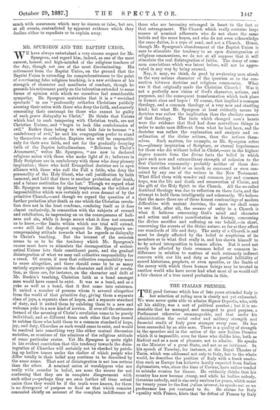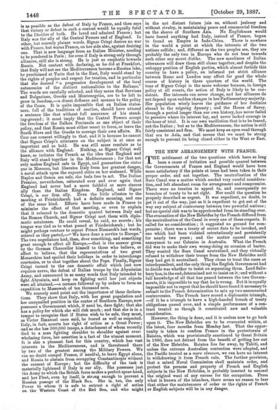THE ITALIAN PREMIER.
THE good fortune which has of late years attended Italy in her selection of ruling men is clearly not yet exhausted. We were never quite able to admire Signor Depretis, who, with all his ability, was a sort of political acrobat ; but it is un- deniable that he managed, and managed to good purpose, a Parliament otherwise unmanageable, and that under his administration the social order and military strength and financial credit of Italy grew stronger every year. He has been succeeded by an able man. There is a quality of strength in the speeches and in the action of the new Italian Premier which it is impossible, even for those who dislike him, both as Radical and as a man of pleasure, not to admire. He speaks as the Minister of a great State, and not as an intriguer. In his speech of Tuesday, for instance, at the Royal Theatre of Turin, which was addressed not only to Italy, but to the whole world, he describes the position of Italy with a frank resolu- tion such as Europe hen hitherto hardly expected from Italian diplomatists, who, since.the time of Cavour, have rather tended to mistake evasion for ,finesse. He evidently thinks that his country has now become etrong, and while he bullies nobody, threatens nobody, and is sincerely anxious for peace, which must for twenty years be the first if alien interest, be speaks out as no predecessor has yet ventured to do. He claims for Italy equality with France, hints that 'he defeat of France by Italy
is as possible as the defeat of Italy by France, and then says that victory or defeat in such a contest would be equally fatal to the liberties of both. He loved and admired France ; but Italy was the ally of the Central Powers and of England. In other, but scarcely plainer words, Signor Crispi desires no war with France, but warns France, on her side also, against desiring one. That is new language from an Italian Minister, needing to be pondered in Paris ; for even if Italy is strong only through alliances, still she is strong. He is just as emphatic towards Russia. Not content with declaring, as he did at Frankfort, that Italy will not see the Mediterranean become a Russian lake, be proclaimed at Turin that in the East, Italy would stand by the rights of peoples and respect for treaties, and in particular that she desired "a progressive development of the local autonomies of the distinct nationalities in the Balkans." The words are carefully selected, and they mean that Servians and Bulgarians, Greeks and Montenegrins, are to be left to grow in freedom,—a direct defiance and menace to the policy of the Czars. It is quite impossible that an Italian states- man, full of the traditions of caution, should have uttered a sentence like that without full assurance of his stand- ing-ground ; it must imply that the Central Powers accept the freedom of the Balkan Peninsula as one object of their policy, and that Russia must either resort to force, or leave the South Slays and the Greeks to manage their own affairs. No Czar can consent willingly to that, and it is because he cannot that Signor Crispi's utterance on the subject is at once so important and so bold. He was still more resolute as to the alliance with England. Nothing, as Signor Crispi well knew, so irritates the French as the idea that England and Italy will stand together in the Mediterranean ; for that not only makes England safe in Egypt, and guarantees the status quo in Morocco, but liberates Italy from her greatest danger, a naval attack upon the exposed cities on her seaboard. While Naples and Genoa are safe, she feels free to act. The Italian Premier, nevertheless, reiterated over and over again that England had never had a more faithful or more sincere ally than the Italian Kingdom. England, said Signor Crispi, is our firm ally. Even the little allusion to the meeting at Friedrichsruh had a definite meaning, and one of the same kind. Efforts have been made in France to minimise the effect of that meeting, or even to explain that it referred to the domestic quarrel between Italy and the Roman Church, and Signor Crisp' met them with diplo- matic astuteness. He could reveal, he said, no secrets ; his tongue was tied as to what passed at Friedsrichsruh ; but he might perhaps venture to repeat Prince Bismarck's last words, uttered as they parted,—" We have done a service to Europe." The two negotiators had, then, done something, and something great enough to affect all Europe,—that is the answer given by the German Chancellor himself to those who believe, or affect to believe, that the representatives of two great Monarchies had spoiled their holidays in order to interchange courtesies, or to chat together about the Pope. Finally, Signor Crispi turned to the one domestic affair which just now requires nerve, the defeat of Italian troops by the Abyssinian Army, and announced in so many words that Italy intended to fight Abyssinia, and keep on fighting until her just objects were all attained,—a menace followed up by orders to form an expedition to Massowah of ten thousand men. We scarcely used point out the importance of these declara- tions. They show that Italy, with her great population and her unequalled position in the centre of Southern Europe, now possesses a Government which, if need be, dare fight; that she has a policy for which she will risk much ; and that she is in a temper to recognise that if States wish to be safe, they must, as Victor Emanuel once said, be feared as well as respected. Italy, in fact, asserts her right of action as a Great Power ; and as she has 500,000 troops, a detachment of whom recently died to a man fighting shoulder to shoulder against over- whelming force, her assertion is a fact of the utmost moment. It is also a pleasant fact for this country, which has vast interests in the Mediterranean, and is threatened there by two of the greatest among the Military Powers. We can no doubt compel France, if needful, to leave Egypt alone, and Russia to abstain from occupying Constantinople without the consent of Europe ; but the difficulty of the task is materially lightened if Italy is our ally. She possesses just the Army to which the British force makes a perfect spear-head, and her Fleet, even by itself, is strung enough to prevent a Russian passage of the Black Ses. She is, too, the only Power to whom it is safe to entrust a right of action on the Western Coast of the Red Sea, and who might in the not distant future join us, without jealousy and without rivalry, in maintaining peace and commercial freedom on the shores of Southern Asia. No Englishman would have feared anything had Italy, instead of France, begun to found an Empire in Indo-China. There is nowhere in the world a point at which the interests of the two nations collide ; and, different as the two peoples are, they are probably the only two in Europe who do not bear towards each other any secret dislike. The new manliness of Italian utterances will draw them still closer together, and despite the unhappy position of English parties, which almost forbids this country to have a policy, an informal yet strict alliance between Rome and London may affect for good the whole course of history in three quarters of the world. The tone of Signor Crispi is the more welcome because, in foreign policy at all events, the action of Italy is likely to be con- sistent. Her interests can never change, and her alliances do not depend upon sudden changes in her Parliamentary majority. Her population wisely leaves the guidance of her destinies abroad to the reigning dynasty ; and the House of Savoy, through a period longer than our own history, has never failed to perceive where its interest lay, and never lacked courage in the hour of trial. It is our own vacillation that is to be feared, not the Italian ; but as to the Mediterranean, the nation is still fairly consistent and firm. We must keep an open road through that sea to Asia, and that means that we must be strong enough to prevent its being closed either in the West or East.



































 Previous page
Previous page